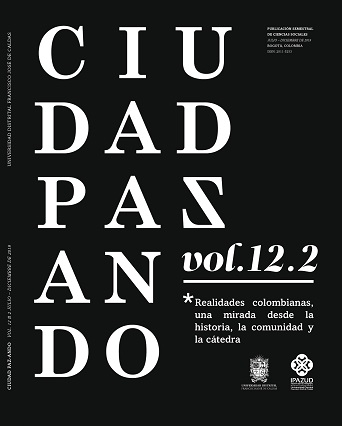DOI:
https://doi.org/10.14483/2422278X.13954Published:
2019-11-23Issue:
Vol. 12 No. 2 (2019): julio-diciembre. Realidades colombianas, una mirada desde la historia, la comunidad y la cátedraSection:
Dossier centralMemoria histórica en Colombia: subjetividades y recomposición del tejido social a través de la narración
Historical memory in Colombia: Subjectivity and reconstruction of the social fabric through narration
Memória histórica na Colômbia: subjetividades e recomposição do tecido social por meio da narração
Keywords:
Subjetividad, historia, narración, simbólico, verdad y reparación (es).Keywords:
conflict, historical memory, narrative, reconstruction, victim (en).Keywords:
conflito, memória histórica, narração, re-construção, vítima (pt).Downloads
Abstract (es)
En el marco del proceso de paz en Colombia, el esclarecimiento de los hechos sucedidos durante el conflicto propician procesos de reconstrucción de la memoria histórica con las voces de las víctimas que “contribuyen a la reparación integral, a las garantías de no repetición y a la construcción de una paz sostenible.[1]”. Este proyecto busca reflexionar cómo a través del relato se entretejen modos de reconstruir subjetividades y evitar “el desfallecimiento de la memoria”[2]. El relato no se constituye únicamente por medio de la oralidad, sino que recurre a diferentes objetos y espacios que son un puente entre las subjetividades y el reconocimiento de las víctimas del conflicto.
Abstract (en)
Within the framework of Colombia’s peace process, clarifying the events that occurred during the conflict fosters processes to reconstruct historical memory through the victims’ voices that ‘contribute to comprehensive reparation, ensuring that these events are never repeated and constructing sustainable peace’. This paper seeks to reflect on ways in which different paths of reconstructing subjectivity is interwoven through nar-ratives, thus preventing loss of memories. Narratives not only translate into stories that are constituted through oral commu-nication but also use different objects and spaces that bridge subjectivity and recognise the victims of conflict.
Abstract (pt)
No âmbito do processo de paz na Colômbia, a clarificação dos acontecimentos ocorridos durante o conflito propicia proces-sos de reconstrução da memória histórica com as vozes das vítimas que “contribuem para a reparação integral, para a ga-rantia da não repetição e para a construção de uma paz susten-tável” (Centro Nacional de Memória Histórica). Este projecto procura reflectir sobre a forma como, através da narrativa, se entrelaçam as formas de reconstrução das subjectividades, evitando assim o colapso da memória. A narrativa não só se traduz na narrativa que constitui o meio da oralidade, como também recorre a diferentes objectos e espaços que consti-tuem uma ponte entre as subjectividades e o reconhecimento das vítimas do conflito.
How to Cite
APA
ACM
ACS
ABNT
Chicago
Harvard
IEEE
MLA
Turabian
Vancouver
Download Citation
License
Copyright (c) 2019 Ciudad Paz-Ando

This work is licensed under a Creative Commons Attribution-NonCommercial-ShareAlike 4.0 International License.
The Ciudad Paz-ando Journal (RCP) is an open access publication, without economic charges for authors or readers, whose biannual publications are made under the terms of the Creative Commons Attribution - Non-commercial - Share the same License (CC-BY-NC -SA 2.5 CO), with which others may distribute, remix, retouch, and create from the work in a non-commercial way, as long as they give credit and license their new creations under the same conditions.
The copyright holder is Ciudad Paz-ando journal, retaining all rights without restrictions, respecting the terms of the license regarding the consultation, download and distribution of the material.
When the work or any of its elements are in the public domain according to the applicable current law, this situation will not be affected by the license.
Likewise, we encourage authors to deposit their contributions in other institutional and thematic repositories, with the certainty that culture and knowledge is a good for all and for all.

